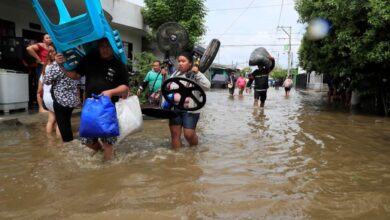During a visit to Venezuela, President Gustavo Petro of Colombia unveiled an intriguing proposal – "economic stabilization" bonuses for Venezuelan migrants en route to the United States. This article delves into the implications and challenges of this groundbreaking idea.

Photo: 18/11/2023.- Venezuelan President Nicolás Maduro (right) and Colombian President Gustavo Petro speak at the end of a meeting today in Caracas, Venezuela. EFE/ Miguel Gutiérrez
The Latin American Post Staff
Escucha este artículo
Leer en español: Audaz presidente colombiano propone bonos para la migración venezolana
A Bold Proposal: Economic Stabilization Bonuses for Venezuelan Migrants
In a significant development in the complex and contentious realm of international migration, Colombian President Gustavo Petro, while visiting Venezuela, has put forth an unconventional proposition. President Petro revealed that he had proposed to the United States the implementation of "economic stabilization" bonuses for Venezuelan migrants passing through Colombia on their way to the United States. This audacious plan raises questions about its feasibility, potential benefits, and broader implications for the global migration discourse.
During a joint press conference with Venezuelan President Nicolas Maduro, Petro stated, "We must reach an agreement with the United States on migration." He explained that the proposal involves providing economic stabilization bonuses to Venezuelan migrants, although specific details and the timing of this proposal were not disclosed.
Aiming for Home: The Purpose of Economic Stabilization Bonuses
The primary aim of these bonuses, as articulated by Petro, is to enable migrant families "to return to their home, to their land." This vision acknowledges the plight of the millions of Venezuelans who have left their homeland due to the prolonged economic crisis that has gripped the nation since 2017. Colombia alone is currently home to nearly 2.8 million Venezuelan migrants, constituting a substantial portion of the over 7 million who have fled their home country in search of better opportunities and stability.
President Petro emphasized that the proposal does not seek to compel migrants to return to Venezuela but to provide them with the choice. He stated, "I believe that this exodus … should reroute toward their country of origin because, for the most part, they are Venezuelans." This approach underscores the importance of respecting the agency and decisions of migrants, who should have the option to either return to their homeland or remain in the host country, Colombia.
Uncertain Future: Maduro's Government Silent on Petro's Proposal
However, it's worth noting that President Maduro's government did not offer any immediate response or commentary on Petro's proposal. This silence leaves the plan's future uncertain, as it depends on a multilateral agreement involving the United States, Colombia, and potentially Venezuela. The intricacies of negotiating such an agreement, especially given the complex political dynamics in the region, will likely prove challenging.
In addition to the proposal on economic stabilization bonuses, President Petro touched upon the possibility of collaboration between Colombia's majority state-owned oil firm, Ecopetrol, and Venezuela's state-run oil company, PDVSA, in the exploration of gas and oil resources. He described this as a step toward "true energy integration between the two countries." However, Petro needed to provide specific details regarding this energy partnership, leaving room for speculation about the nature and scope of such cooperation.
The proposition of providing economic stabilization bonuses to Venezuelan migrants carries both potential benefits and challenges. On the positive side, it recognizes the dire economic circumstances that have driven millions of Venezuelans to seek refuge in neighboring countries, particularly Colombia. By offering financial incentives to migrants, the plan could alleviate some of the economic burdens they face, potentially improving their living conditions and increasing their prospects for self-sufficiency.
Navigating Challenges: The Complexities of a Multilateral Agreement
Moreover, the emphasis on choice within the proposal aligns with human rights principles and individual agency, allowing migrants to make informed decisions about their future. This approach acknowledges the complex factors that influence migration decisions and respects the autonomy of those seeking better opportunities.
However, implementing such a plan would involve significant logistical and financial challenges. The scale of Venezuelan migration is vast, and determining eligibility for economic stabilization bonuses and ensuring the equitable distribution of funds would require meticulous planning and administration. Moreover, securing cooperation and funding from the United States and other stakeholders is not guaranteed.
Also read: Venezuela Defiant in Territorial Dispute with Guyana
In conclusion, President Gustavo Petro's proposal for "economic stabilization" bonuses for Venezuelan migrants marks a notable development in the ongoing global conversation about migration. While it raises intriguing possibilities for improving the lives of migrants and respecting their choices, it also presents substantial logistical and diplomatic hurdles. The response of key stakeholders, including the United States and the Venezuelan government, will shape the fate of this proposal and influence the future of migration policy in the region.





